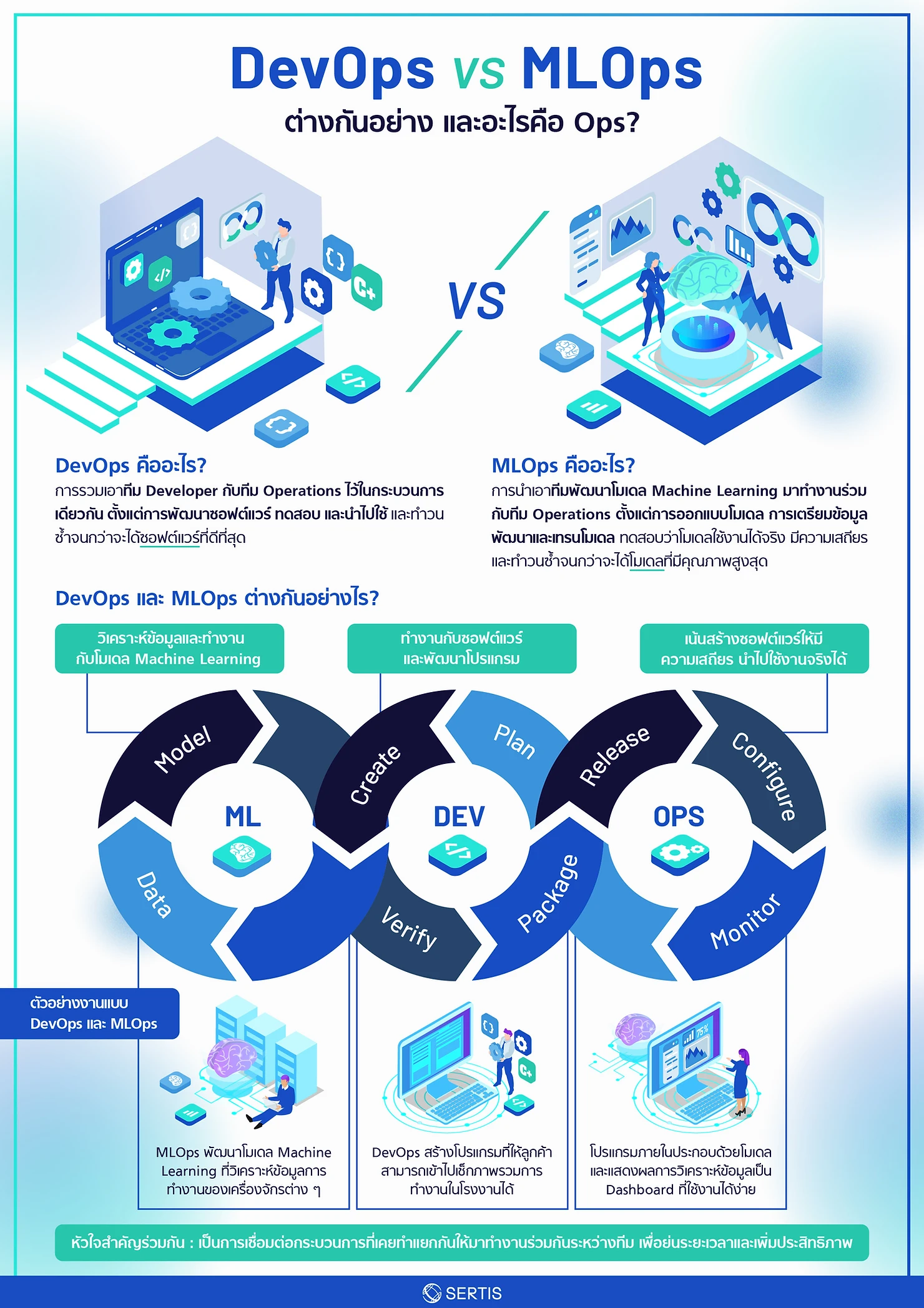
DevOps and MLOps are some of the buzzwords in the tech industry that we have heard a lot recently. However, some might still not clearly understand what they are, and what does the abbreviation 'Ops' mean?
Developing state-of-the-art technologies in the fast-moving world with various competitors in this modern day. Delivering at speed is necessary, while at the same time, the stability and reliability of applications can not be overlooked.
With the requirement of both velocity and stability, new kinds of working practices were created for both software development and model development called DevOps and MLOps, which we will take you through today.
Sertis would like to introduce you to DevOps and MLOps to see what they are and how innovative and efficient these practices are.
What are Dev, ML, and Ops
The practices of DevOps and MLOps are the combination of different teams. 'Dev' is shortened from 'Developer', 'ML' from 'Machine Learning ', and 'Ops' from 'Operations'. These three abbreviations represent different roles and responsibilities. Combining them creates a new set of practices that integrate their working process.
What is Dev?
Dev is shortened from the developers in the software development team. They are responsible for creating and customizing software applications for organizations and businesses to facilitate operations and increase productivity using automated software programs.
What is ML?
ML is shortened from a machine learning team, which is responsible for building a machine learning model to automatically analyze big data to find insight that is essential for making business decisions and improving business operations.
What is Ops?
Ops is shortened from the operations team, which is part of the software development team. This team focuses on ensuring the stability, reliability, and deployment of the software applications.

What is DevOps?
DevOps is a set of practices that combine the tasks of developers and the operations team that were once siloed in one feedback loop. The cycle includes software development, software testing, and software deployment. We loop through all the tasks until we get the best applications.
Traditionally, the developer team focused on delivering the applications to clients at speed. They were responsible for developing and testing the software. The operations would take care of ensuring the stability and practicality of the application. With their different focuses, the process might not be streamlined. The developer team focused on speed while the operations team focused on stability, which takes a much longer time before delivering to clients. If we wanted one, we needed to sacrifice another.
DevOps facilitates better collaboration between two teams in one life cycle, so that we can achieve both speed and stability. There is also a role called DevOps engineer which requires abilities and skills in both software development and software deployment. Also, there can be both software developers and site reliability engineers collaborating in the life cycle to ensure fast and quality software delivery.
What is MLOps?
Similarly, MLOPs are the collaboration between the machine learning team and the operations team to build and deliver automated and reliable models that are ready to be deployed. The development life cycle includes requirements gathering, model design, data preparation, model development and training, and model testing. The cycle also includes the deployment to make sure the model is successful, stable, and reliable. The processes will run in the feedback loops until we get the high-performing model. MLOps shortens the lifecycle by incorporating the development and deployment process that used to be siloed to deliver quality at speed.
MLOps includes several roles such as a data scientist who takes care of data preparation and a machine learning engineer who is responsible for model development.
What is the difference between DevOps and MLOps?
DevOps and MLOps share the same set of practices and feedback loop of building, testing, and deploying. The steps run in infinite loops until we get the best models or software. It is a cohesive step that emphasizes development and deployment at the same time to speed up the processes and maximize usability.
The main difference is their roles and responsibilities. DevOps focuses on software development, coding, and software deployment. In contrast, MLOps works with data and machine learning models. MLOps unite collecting data, cleaning data, preparing data, building a model, and training and automating a model.
The goal of DevOps is to build a software tool to improve efficiency and facilitate more streamlined and time-effective operations. On the other hand, MLOps focuses on building a model that provides data insight for better business decisions, generating more profits, and improving operating performances.
In conclusion, these two practices require different areas of expertise to achieve different goals. However, they share the same key concept of unifying the steps that were once siloed and encouraging communication and collaboration between teams to maximize the speed and efficiency of both software and model development.
The example of DevOps and MLOps deliverables
DevOps and MLOps aren't a role, but they are practices consisting of several roles and responsibilities collaborated in one practice. How to select between practices depends on what we need for the project. For example, let's ask ourselves whether we are finding data insight for better and more informed decisions or a tool to facilitate operations. We can also integrate these two practices in a single project.
For instance, we can use MLOps to build machine learning models that analyze machinery and equipment data. Then, use DevOps to develop a software program that allows users to monitor manufacturing operations, which include the user-friendly dashboard that displays real-time analytics from the model in the program.
Do you start to get a picture of these two practices? If you are interested in experiencing the practices of DevOps and MLOps, which shape the future of tech industries nowadays, and if you want to maximize your potential with clients from various industries, Sertis is the right place for you. See more about open positions and job opportunities at https://www.careers.sertiscorp.com/jobs